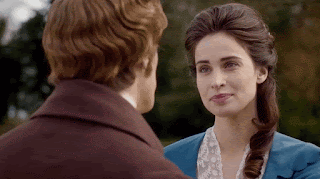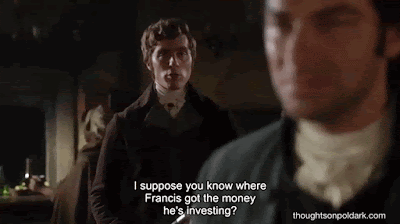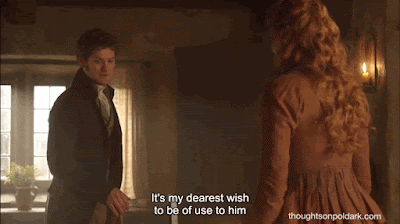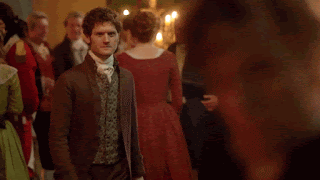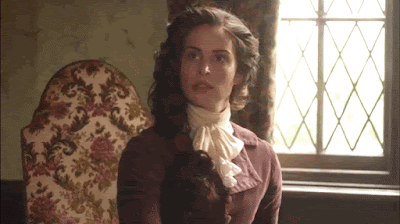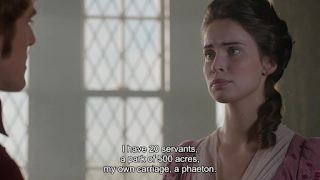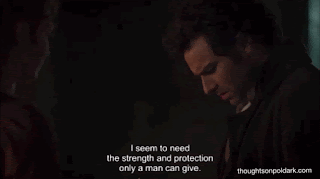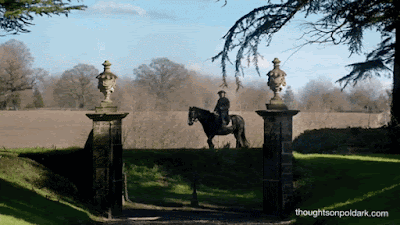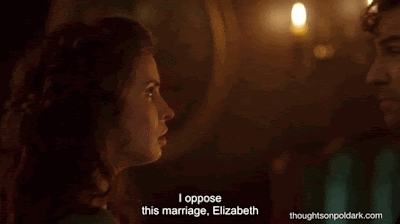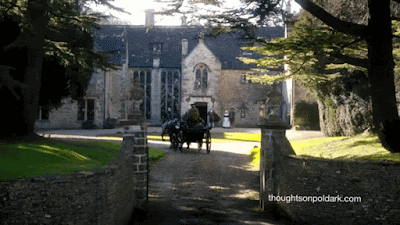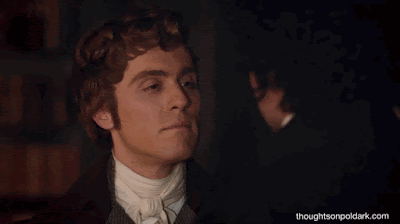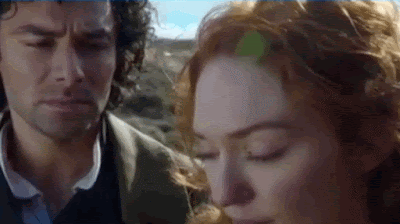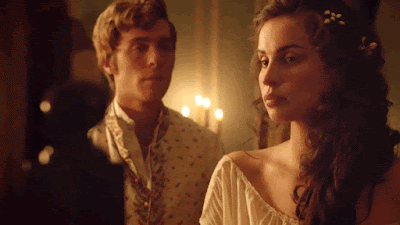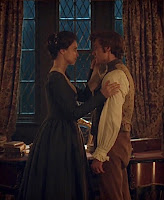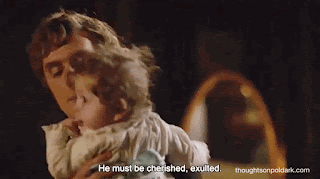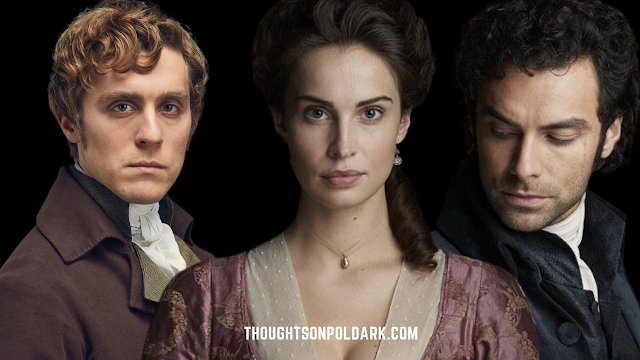
This is the third post in the series covering the feud between Ross and George and in the main it covers and takes us up to the end of the fourth book 'Warleggan'. The main theme here is George successfully tempting the disloyalty of Francis and Elizabeth towards Ross in favour of him, and Ross's violent reaction to this. Indeed the theme establishes that disloyalty was somewhat of an Achilles heel to Ross and that whilst disloyalty by his friends could evoke violence from Ross, on the other hand his own loyalty towards his friends could equally bring Ross to violence against George in defence of them. As will be addressed below it did for Francis and Demelza. Also just like with the last post in the Ross vs George series, ('Encroachment And Plans to Kill A Cat') there is still a theme of encroachment in this post too as George makes the ultimate move with this with Ross's 'greatest friend' Elizabeth and through this also an encroachment of the Poldark ancestral home. However it is also the case that in some significant way, and to Elizabeth's dishonour (and very much his own!) Ross returned the favour by quite literally taking by force George's new 'possession' of Elizabeth before later then making a significant turnaround in this feud and trying to reach out to George in peace.
Spotlight on Elizabeth
Along with George, Elizabeth particularly gets a spotlight in this post because she is regarded as some sort of a 'prize' to be gained in the feud. She would be the potential prize wife to George and as the idealised 'ideal woman' who was Ross's first love, in some way her friendship was important to him and something he wrongfully expected came with some loyalty towards him if faced with a choice between him and George. The defection of Elizabeth's loyalty from Ross to George cannot be ignored as it is the trigger to the climax of the love triangles and ultimately paved the way for resolution in the all important Ross and Demelza love story. Although it did however continue the misery in the stories of George and Elizabeth.
Elizabeth The Character And Agent Of Division
To understand Elizabeth's role it is helpful to consider that Winston Graham once said in a BBC Radio 2 interview on 'The John Dunn Show' aired on June 27th 1991 that Elizabeth was the character that "..divided the families.." and that though he did later change his mind after he wrote her death, he was initially reluctant to write further books when the BBC had wanted material for a third series. This was because to him "...Elizabeth had been the point of conflict.." Indeed this was her role from her very first scene in the book. Even before then when she chose to court Ross's cousin and created tension in their relationship which in that case did not hold. However her continued behaviour in creating upset, disturbing peace of mind within Ross's mind within his marriage to Demelza and conflict in other areas (Morwenna and Drake), will be examined in other posts too. Still in this post her decisions, how she carried them out and the defection of her loyalty from Ross to George will see her live out Graham's explanation of what she represented in the story. Such is the case that by the end she would even go against her own claim to be a peace maker for Ross and George and generally actually played a part in the continuance of the conflict.
30 Piece Of Silver for Francis?-The First Violence Of Ross
To begin with, and in demonstrating just how emotionally affected Ross was by the idea of disloyalty by his friends, it was after many verbal clashes with George that this notion of Francis's disloyalty now brought Ross to attack George physically in the Red Lion Tavern. This was in the third book 'Jeremy Poldark' and due to its nature this was a rather explosive incident.
So after six years of being provoked and hounded by George in his business affairs it was George's suggestion that Francis had betrayed him and been disloyal against him in favour of George that brought Ross to violence.
Ross had known that Francis had received £600 from George which Elizabeth had told him was in recompense for the gambling fraud of the Warleggan cousin, Mathew Sansom. He had also suspected that wrongly believing Ross had engineered Verity's elopement Francis had given the names of the men behind the Carnemore Copper Company to George. However he thought this was in anger and a separate matter. He did not connect the two and Graham wrote that 'It had never once occurred to Ross that Francis could deliberately have 'sold' them for money...' Yet George implied Francis’s actions were a more sinister, calculated and transactional selling out of Ross when he taunted Ross saying; "Yes, we paid it him- the Warleggans- for services rendered. Six hundred pounds...or thirty pieces of silver." Nothing more was said by Ross who immediately unleashed a violence upon George which started with him attempting to choke George with his neck cloth, lifting him off his feet and throwing him over stair bannisters.
Ross: Disloyalty Breeds 'Unreasonable' Violence
Of course George's meeting with Francis in 'Demelza' where he coaxed out from him the names of the men behind the Carnemore Copper Company was a key move by George and possibly his best, or second best strategic strike against the Ross. As referred to in the last post, when the Warleggans acquired Ross's promissory note it was not about the money. For them it was about their goal to 'get the man'. The story showed that the best way to do that in respect of Ross was to strike at matters of the heart. Graham made this clear when writing that in this first physical clash with George and Ross there was a particular provocation in '...the subject of the quarrel.' He went on to state that for Ross 'There lay the poison.'
The suggestion of disloyalty was the poison. Disloyalty as Ross's 'Achilles heel' did not just apply to George. He reacted badly when it was shown towards him by those he instead most expected loyalty from. Graham made Ross to be known for his fairness and concern for the social and economic well being of others. As long term servants of his father but also almost completely useless and often drunken in their jobs he had kept Jud and Prudie on at Nampara with himself as their master. This was his loyalty to them. Therefore his reaction six years later to Jud's gossip that Ross might be Bengy Carter's father on account of their similar face scar was alarming. Before sacking both Jud and Prudie and making them leave Nampara straightaway he had Jud under the pump frantically working the water over him and cracking a horsewhip when he tried to free himself from the drowning. In narration Graham reminded the reader that Ross 'In many ways an easygoing man, he would have tolerated much for the sake of loyalty...but Jud's disloyal slander could not be swallowed at any price.'
It is significant that Graham marked Ross’s violent behaviour to George as out of the ordinary when he narrated Ross’s thought that 'He did not remember in his life having lost his temper in quite that way before.' He also thought that 'George's face, George's sneers, the oppressive influence of the Warleggans over all his life, had suddenly boiled up into a moment of un-controllable fury.' The track record had been set previously as Graham wrote that 'There had been at least one instant in the past when it might have done so with greater reasonableness...' In this Ross's wild behaviour plundering the Warleggan ship at the end of ‘Demelza’ was clearly being alluded to. But now, in this, following George's provocation to matters of the deepest heart Ross in this thought 'Now the murder was out with a vengeance.'
The importance of these scenes is that they served as forebodings. They documented that not only could Ross be brought to unreasonableness due to Warleggan provocation but that the additional element of a perceived disloyalty against him by those he expected to be loyal to him and particularly if the disloyalty was in favour of George could bring Ross to actual and direct physical violence of an uncontrollable nature. This goes a long way in setting the context for Ross's psyche for later events where he would perceive a much greater and far reaching disloyalty by Elizabeth who he expected loyalty from. The reader would see that she was not immune from his wrath and he would strike out directly against her too.
Violence For The Honour And Defence Of A Redeemed Francis
It is notable that despite the poison in the quarrel being the suggestion of disloyalty and betrayal by Francis to the Warleggans, Ross assaulted George not Francis. Francis was left unscathed by him and Ross did not even show any anger directly to Francis. Knowing that Ross would later attack Elizabeth for his perception of her disloyalty that means there was a difference in Ross's reaction to Francis's betrayal as against Elizabeth's. The reason why relates to Francis redeeming himself through acts of conscience and making amends since then. This will be addressed to a fuller extent in the upcoming post 'The Redemption of Francis Poldark' and touched on in 'The Real Francis Poldark', but to summarise it was not long after his betrayal (possibly days after) that Francis was deeply ashamed of his actions, saw the error of his ways and reaffirmed his loyalty to Ross in many ways. Ross could see this and this made a difference. It meant that he would then even question whether Francis did betray him in the way George implied and Graham explained that '...it was the impulse to reject it which had led to the fight...So the fight had been in defence of Francis's character.'
Ross could give Francis the benefit of the doubt for a number of reasons. Firstly he thought that '...if there had been a betrayal it had taken place in sudden anger during the quarrel over Verity's elopement.' Then secondly and more importantly thinking of Francis's disloyalty he had considered 'That Francis had suffered in his own conscience because of it was plain to anyone who had met him in the last twelve months.' This is the difference between Francis's betrayal against Elizabeth's. Elizabeth's defection was not in anger but thought out and then as to be considered below with some subterfuge and secrecy thrown in too. Also as to be explored in later posts Elizabeth's lack of conscience and accountability was probably a leading characteristic that made the difference the other way and meant that many of her errors were left unredeemed or that she sometimes simply failed to salve the upset she caused by her response in the aftermath.
George: A New Strategy- Recruiting Elizabeth
So with Francis even to his own cost and financial detriment being willing and able to shake off the devil (George) soon after, his disloyalty to Ross was not only temporary but acknowledged by him as an impulsive mistake in anger and for which he sought recompense for. That meant that George hit a dead end with him and there was no amount of wooing he could do to get Francis back on side. Graham demonstrated his master story telling ability in moving the story forward in 'Warleggan' so that the new phase in George's campaign against Ross was to tempt Elizabeth to disloyalty. As the story went on Ross would try but fail to prevent this because of the fragility of Elizabeth's loyalty.After Francis's death Ross would later explain to Demelza that 'George Warleggan's ambitions, long before Francis died was to drive a wedge between them and me...by befriending them." With Elizabeth reassuring Ross that 'Loyalty's not all on one side, Ross nor ever has been.", he wrongly trusted that her allegiances were with him and would remain with him. Also after she became a widow he explained that anonymously giving Elizabeth £600 (roughly two or three years income) would have "..the effect of strengthening her hand against him (George)." Ross would find that his efforts were in vain.
Elizabeth: A Perverse Pleasure In Disloyalty
"Loyalty's not all one one side, Ross nor ever has been."
Elizabeth to Ross- ('Warleggan- Book two - Chapter six)
The theme of Elizabeth's disloyalty towards Ross was long established from her opening scene in the saga at her engagement dinner to Francis but it would be an error to think that her renewed disloyalty only occurred after Francis's death and because she became a widow. Her long running disloyalty will be considered in the upcoming post 'Dear Ross From Elizabeth (Your Greatest Most Disloyal Friend)' but even Graham's opening first scenes for both George and Elizabeth in 'Warleggan' was centred around this theme. Whilst in a visit to her George attacked his perception of her "...vast affection for Ross.", he appealed for her to hear his side of the story about Ross. Reeling off a list of criticisms about Ross's character there was a sneak peek at Elizabeth’s obvious continuing disloyalty. In the first instance this was in her failure to offer any defence for Ross and instead in the second it was as Graham wrote that for her '..there was some grain of perverseness which took pleasure in seeing the other side.' This likely served as an indication of George's future success in coaxing Elizabeth to full disloyalty because even without significant pressure in this particular scene or any tempting proposal by George it demonstrated Elizabeth's lukewarm loyalty to Ross, a likely willingness to switch sides and the absence of a natural outrage at insults made against her friend that most friends would have the spirit to defend. She did not.
Elizabeth: 3o Pieces Of Silver And All The Kingdoms Of The World
"If by befriending us he can put a new division between us and Ross, he will certainly have gained his object. Do you want that?
Francis Poldark to Elizabeth ('Warleggan'- Book one - Chapter Two)
Before her ‘perverse pleasure’ of George's criticisms for Ross this question put to Elizabeth by Francis met with a hesitant response from her. She eventually uttered what reads as a rather weak spirited "No". Her later disloyalty was therefore almost predictable. Graham's writing was also almost satirical whereby he referred to George as the devil offering Elizabeth all the kingdoms of the world to marry him and Elizabeth's finding then that '...a favourable answer was no longer impossible for her.' She then agreed to marry George. This draws obvious parallels with how George had secured Francis (temporary) disloyalty against Ross. In that case too the prelude was also buttering up by an offer of money and therefore a material benefit. For Francis it had been presented as £600 as a kind and honourable recompense for unfair gaming losses. Although Francis fell for this as a friendly gesture it was clear that Elizabeth was less naïve about George’s offer to her and the direct meaning as to loyalty towards Ross. The offer was too enticing as Graham wrote she 'held her head down as if in defeat.'
A Defeat of Pride Not Loyalty
This feeling of defeat that Elizabeth felt would not necessarily be to her about being disloyal to Ross. That perhaps was just collateral damage along with the fear of loss of his admiration and approval but above that Elizabeth revealed to Ross later that she never before had considered George a man she would marry. He was an upstart who was trying to be accepted in the gentry. He was not liked for his character and Graham narrated in 'The Angry Tide' that George had wrongly blamed his electoral loss in favour of Ross on his class when it was simply due to his character. There was an embarrassment about George's try hard efforts to fit in which Elizabeth had always known of but she patronised him for his money, power and admiration he bestowed on her. Still, marriage to such a man had never been on the cards and in 'The Angry Tide' Graham wrote that she was excited about becoming a titled lady because she 'had been conscious ever since she married George of having lowered herself in the eyes of the country; this would make up.' Now being asked to marry such a man, not wanting to but knowing it dealt with her money problems would have been the greater element of her feeling of defeat. In time we would see her get over and find herself feeling her marriage to him was 'successful' in her mind.
Elizabeth's Premeditated Subterfuge
There is a sympathetic angle to Elizabeth's predicament as she was in a difficult position when George asked her for marriage. A position mainly of battling against principle versus comfort. She was not the book heroine and so the choice to bravely sacrifice comfort was not to be expected from her. Elizabeth had the spirit of a conformer rather than one who defiantly goes against the grain on a point of principle and at the cost of her position and comfort. There is also a good case to state that Elizabeth's decision to marry George was her own business, for reasons of survival and Ross had no right to question that. However Elizabeth herself was not that oblivious to human emotion and the bonds of friendship and loyalty to think and act as if she thought it was so simple and therefore none of Ross’s business. There are dynamics to the act of 'betrayal' which are complex, emotional and relate to treasured confidences and bonds. However even on a practical level at least as the only living adult Poldark and co-executor of the Poldark estate with her at that time, Ross had an interest in knowing of her marriage in good time since her new husband would either take over estate management or work in partnership with him on it.
Elizabeth's subterfuge in not disclosing her engagement to Ross over an eight week period during which he visited her weekly suggests that something inside her perceived it was a disloyalty that could not be easily defended. This is particularly after Ross had previously told her that it was up to her if she wanted to accept favours from George and she indicated and therefore led him to believe that preferring not to alienate people she liked better (such as Ross) she had already decided she did not want to do this. So adding to the provocation she specifically misled him.
Elizabeth: An Excitement In Defection
"..she seems different in some way, a little on edge, as if innerly excited....One gets the impression that she thinks her circumstances are going to change."
Verity to Demelza ('Warleggan' Book three- Chapter three
So in contrast to Francis Elizabeth, fell into disloyalty against Ross not impulsively or out of a belief that Ross had done her any wrong to avenge, and she did so with the additional and greater insult to Ross of maintaining a pretence of loyalty. All this while undertaking months of dishonesty hiding her engagement from Ross. As Verity observed an inner excitement in Elizabeth which she then was not aware of the reason for, it appeared that unlike Francis who as Ross had detected had 'suffered in his own conscience', although she clearly feared and delayed letting Ross know, Elizabeth did not show prolonged suffering in her conscience beforehand but excitement.
A Deadly Blow by George to Ross?
Of course from George's perspective by Elizabeth agreeing to marry him he had thought he scored a major coup in his ongoing war with Ross and though he had always wished to possess Elizabeth '..it dealt what he knew would be the deadliest of blows at his bitterest enemy ...by a single coup."
Elizabeth: I Don't Need To Justify My Disloyalty To You Ross
As referred above Francis's attitude of regret, conscience and acts to make amends made all the difference in Ross's upset with him, whereas there was no such attitude from Elizabeth about what she even considered to be disloyalty towards Ross (or what she knew looked like disloyalty). Whether she was justified or not in marrying Ross’s greatest enemy, from Ross's perspective there was also no attempt by Elizabeth to greatly defend her dishonesty and disloyalty. Or like with Francis there was nothing to have shown him much of a struggle by her with her conscience. The weeks of Elizabeth’s subterfuge, claims of loyalty and then a rather detached delivery in her admission of marriage sent by letter were greatly unhelpful and cowardly in her cause. They added to the offence and disrespect of it all and then in her letter to Ross she said "I cannot give you reasons for marrying George, for reason suggest I need justification...." Her letter is to be explored in another post but though seemingly apologetic in tone, in many ways her initial response to Ross mirrors hers at her wedding in respect of her decision to betray her promise to marry him and instead marry Francis . It shows this approach after betrayal was a repeated aspect of her character. Having given him no proper explanation before the wedding and not until six month later really because Ross essentially demanded one, she had at the wedding sought his happiness for her and had tried to fudge her then betrayal by saying "There's no time to explain everything, perhaps I couldn't explain if there were." ('Ross Poldark')
Of course Elizabeth offering no defence and insisting she did not need to justify her act is on the one hand a fair personal stance, (or at least debatable), but if that was the case as she saw it she completely contradicted herself by her weeks of deceit and subterfuge before her short notice engagement announcement. Whilst it could be presumed that Ross's explosive reaction was out of anger only towards George as will be explored in the upcoming post 'Ross Poldark: A Fall From Grace In A Fall With Elizabeth', there was plenty about Elizabeth's own behaviour too that caused him to direct his anger at her. Whereas the reverse is the case for Francis (and even of Demelza in times when he felt anger towards her). In respect of Francis's disloyalty, such was the case that Ross remained conciliatory with him and despite the act ruining his business venture he brushed this off and instead renewed their friendship further by asking him to partner in his new Wheal Grace venture.
Encroachment Of The Poldark Family Home
Clearly 'encroachment' is a major theme in the history of George and Ross's feud. Mainly an aggressive tactic by George whilst Ross’s preference was to steer clear from all things Warleggan. Graham reveals that this was the biggest issue for Ross in George's marriage to Elizabeth. As Ross pleaded with Elizabeth, not that she should not marry at all but that she should not marry George Warleggan, the indications are that the real offence to Ross was the implications of her marrying George and enabling him as his 'greatest enemy' to further encroach on Ross's life and the things that meant much to him. Including Trenwith! Graham eventually revealed that this was the greater upset to Ross and wrote that after the marriage had taken place George coming to live at Trenwith some months afterwards was "a crowning indecency" and that the news of George and Elizabeth moving in to Trenwith '...served to incense Ross more than the news of the wedding...'
Elizabeth's Gift To George -The Keys To Trenwith
As Ross stated that his feelings on Elizabeth's marriage was something he "had to think out.." it is then clear that what was the more powerful and dominating emotion for Ross was not the 'prize' of Elizabeth allegiances but George's oppressive influence and encroachment on what was as Ross described "...part of the Poldark family." Ross went on to say that "...I cannot accustom myself at all to the idea of its belonging to George." He considered it a "monstrous perversion". It would not be until the tenth book 'The Loving Cup' taking place exactly twenty years later where Ross would give a joyous speech in front of George at Trenwith expressing as Graham wrote '..his extremest pleasure ..to see his cousin return to claim the family home that was his;..' Before then Elizabeth had followed through with further offences after her marriage to immediately give George power of attorney to take over from her in the decisions for Trenwith. In allowing him to manage it in his way their pathways were closed and boundary walls and trespassing notices were put up meaning that even the locals were excluded from the vicinity, let alone the Poldarks.
The significance of Elizabeth's decision to marry George was not lost in 'Black Moon' where Graham narrated Nicholas Warleggan’s thoughts that '..Elizabeth had brought this (Trenwith) house into the (Warleggan) family.', and later of his '..satisfaction that it had always belonged to the Poldarks.' His satisfaction was Ross's pain and therefore one of the most significant blows from this marriage, if not the worst for Ross, was that Elizabeth had essentially handed over the keys of Ross's family home to his 'greatest enemy'. As his supposed 'greatest friend' it might then be fair to argue that she really should have endeavoured to offer him from the outset and without Ross having to go to her and seek it, some justification for this decision after all.
Elizabeth: Ross's Devious Encroachment?
Upon reading Elizabeth's announcement about her impending marriage Ross on 9th May 1783 would pay her a late evening visit having declared "This thing must be stopped." The romance of Ross's actions that night are highly questionable as both Elizabeth and Ross had separate thoughts where they individually concluded that he had taken her 'by force' , 'against her will' and 'violently'. Three years later in 'The Four Swans' where Ross and Elizabeth met by chance in the Sawle church grave yard, Elizabeth would question Ross in a way that suggests she at least thought his purpose had been unromantic and just as he said to 'stop' the marriage. This is when she told him "If your purpose in what you did was destruction, then you altogether succeeded.", Also she later asked "Is it not devious now to try to save a marriage you did your best to prevent?" It would appear Elizabeth’s outlook was that Ross’s behaviour was not an outpouring of years of pent up passion and love for her but a preventative means to an end.
Elizabeth was right about the destructive nature of Ross's behaviour on May 9th and the bitter irony of George's delight in finally securing and possessing the ‘prize’ of Elizabeth is that Ross's act of violently taking Elizabeth was the ultimate encroachment of George's ‘prize’. It meant that not only did Ross 'possess' George's prize first but due to the suspicions it created, Ross in this one act would forever taint and encroach on the marriage and the happiness that George expected to find from it right till the end of it where they (Elizabeth and George) were parted by death.
The Last Violence: Demelza's Honour
Whilst Ross's penultimate act of violence pertaining to his feud with George was to dishonour Elizabeth, his last was to honour his wife. As he did with Francis he initiated violence on George out of loyalty and defence of Demelza. Such an instinct concerning Demelza would induce him to later kill Monk Adderly in a duel after he insulted her and to rough up a powerfully dangerous French Politian (Tallien) who tried to flirt aggressively with her in the eleventh book 'Twisted Sword'. So this last incident of violence occurred during a frosty meeting with George at Trenwith where acting as Elizabeth's power of attorney George was again provoking Ross with ideas of encroaching further on Ross's business. That being of Wheal Grace which Ross had started to be free of George in the first instance. Ross had refused George’s taunts that he should reverse his anonymous gift of £600 to Elizabeth for Francis's half share in the then unyielding mine and now that it had unexpectedly become a profitable success give Elizabeth back a half share in this mine. Of course if so then George would manage this for her and would also then be back casting his shadow of encroachment over Ross’s freedom venture. But it was not this that triggered the violence. It was George's insult of Demelza to him that he should "Go back to your scullery maid."
White Flag And Olive Branch For George
Bearing in mind that Graham had intended 'Warleggan' to have been the ending of the saga there was some personal resolution for Ross by the end of it in respect of his feelings over George. Having realised it was Demelza that was his true love there also appeared to be resolution for Ross in respect of romantic feelings for Elizabeth. Having declared to Demelza that "... that my true and real love was not for her but for you." , and with Graham narrating that with Demelza '...all he had was all that he wanted.', perhaps his new understanding and appreciation of where his real love and happiness lay explains a rather unexpected turn of events in him offering George a white flag. His renewed contentment had likely subdued his anger and resentment.
Not quite depicted in the last television adaption but instead showing a newly created riot scene at Trenwith, Ross’s real last scene in the 'Warleggan' book with George, and which was in Elizabeth's presence was to offer an olive branch. Instead for the last adaption there was an alternative scene with Ross alone with George at his bank. However in the actual story he did come to Trenwith. Firstly he confirmed that with regard to his intrusion on Trenwith grounds for that visit that he had "...no ambitions here." Again being his family home and still thinking George's occupancy and control of it to be a "monstrous perversion" that change of attitude was a major turn around for Ross. He instead suggested that it was "...tedious to spend all one's life with ones' hackles up." He then stated that "I'd suggest that we avoid heedless provocation and live as peaceable as we can. What is your view?"
Elizabeth's Defection Consolidated -Ongoing Division Secured
What was quite significant about this olive branch scene is that Ross was actually quite determined and persuasive with his white flag proposal but not only was George resistant to this but so too was Elizabeth. Of course with no accounting for her own part she now had a secret grievance against Ross following the night of 9th May but Graham still had her here keeping within her role as an ongoing agent of division. So, very contrary to her reassurances to Ross on the night of May 9th that "I believe -that I can bring you (and George) together, that you can and will be friends.", when Ross turned to her asking that she encourage George to have this more peaceable approach, Elizabeth essentially rejected this by stating that "I've complete faith in my husband's capacity to order his life as he thinks best." Naturally it is no wonder that this and Elizabeth's general demeanour towards him as Graham narrated meant that for Ross 'Seeing her had upset him in a new way.' His 'greatest friend' no longer so, and in the reverse very much against him now. Complete defection by Elizabeth and this exchange was Graham highlighting that where George had failed to secure Francis's permanent allegiances he had done with Elizabeth and this was right till the end of the saga. In making her private commitment to herself much earlier before she married him that 'I shall be George's heart and soul, his faithful wife and his faithful friend!', her defection to George had been secured and permanent. In always staying true to this she consolidated her transition from a 'Poldark' to a 'Warleggan' both in nature as well as name.
The Real Deadly Blow - A New Seed- Ross's Seed
Of course in the story of Ross and George where a 'seed of enmity' played out over this ten year period covering just the first four books, there had been gains and losses on both sides. However whilst Ross now had renewed happiness with his wife, which apart from some rocky two years or so of disruption was generally sustained and fruitful, Ross had unknowingly scored the most offensive encroachment to George. This was by planting a new seed. Worse than a 'seed of enmity' but one that would forever be a taunt and poison to George’s union with Elizabeth. Valentine Warleggan! It would be this seed that would frustrate their marriage. Also it would ultimately lead to Elizabeth's death and therefore for George to the eventual loss of the one 'possession' he had valued most in the world. So George was wrong to think he had won the war or a battle in marriage to Elizabeth and therefore that he had struck '...the deadliest of blows at his bitterest enemy ...by a single coup.' It was Ross who did that on 9th May.
Blogs of Interest

